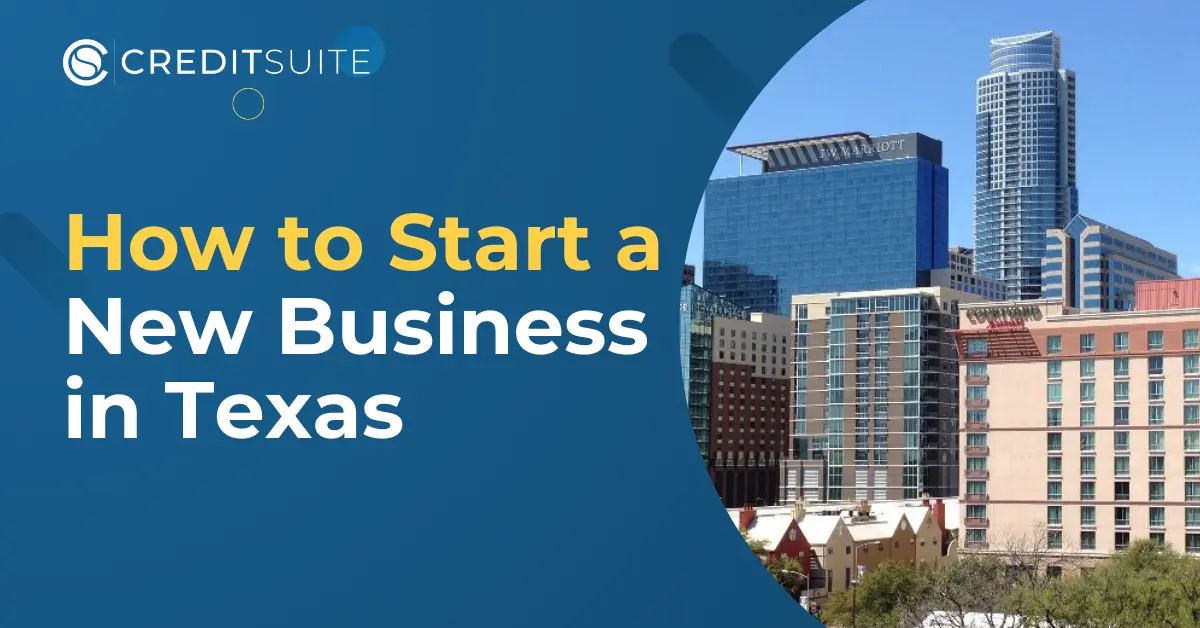Starting a Business in Texas
A new business in Texas is not out of reach. Have you been wondering: how do I start a new business in Texas? And more importantly, can I do so no matter what the economic conditions are? Can I start a new business in Texas during a recession?
New Business in Texas: Pros and Cons
Business Insider ranks Texas as the fourth best state in the country to start a new business. The huge energy industry is one driver of this score. Like California and also Massachusetts, it is one of few states with many clusters of major economic centers rather than one or two.
Texas has a strong startup activity score. The state ties for the fourth highest rate of new business owners. It also has the fourth highest density of startup businesses. In addition, the cost of living is decent.
Recent Improvements
In 2019, Dollar Sprout’s methodology (keep in mind, it’s not identical to Business Insider’s) vaulted Texas to the number one spot! The two main drivers were a low unemployment rate and high growth. Another factor was favorably tax rate calculations (apparently only Maryland does the same). With these calculations, a business is charged proportionately, based on gross annual revenue. Hence a business in Texas doesn’t pay a flat rate.
Start a New Business in Texas – Texas Top Industries
Per a 2014 report from the Texas government, the biggest companies in Texas are mainly in the field of energy. Except for AT & T and Sysco (for food service), all of the top ten companies are within the energy industry.
Digging deeper into the top 50, some other industries show up, such as airlines, and paper products. Top industries in Texas are also computer hardware and software, and construction, among others. In addition, as in most states, the health care and social assistance fields are also large employers.
Start a New Business in Texas – Texas Business Ideas
Smart business owners can find new opportunities. Work with bigger industries in the state. Offer goods or services such as developing and distributing safety equipment for refineries. Other ideas are chemistry and sciences support for the energy industry. There is also trucking for any industry. Then there is computer support in areas such as data or programming.
Here is how to start a new business in Texas.
Start a New Business in Texas – Texas New Business Secretary of State Requirements
Register a Business Name
Filing for a fictitious name allows the creation of a business name which is then separate from a business owner’s legal name. This is called “Doing Business As”, or a DBA.
In Texas, if the business will operate as a sole proprietorship or a general partnership, then an Assumed Name Certificate or DBA for each name the business will use must be on file with the county clerk. And this is for each county where a business location will be maintained. All limited partnerships, registered limited liability partnerships, limited liability companies, corporations, professional corporations, nonprofit corporations, and also professional associations must register with the Secretary of State.
Corporations
In Texas, a corporation must have a unique name. Search online records and also other records to make sure that a name is not in use already.
Corporate Name Reservations
You do not need a corporate name reservation to incorporate a small business in Texas. But if a business owner wants to reserve a name for a corporation they can submit a name reservation application to the office of the Texas Secretary of State.
The name reservation application form can be downloaded at Reserve a Texas Corporation Name at the Texas Secretary of State website. The name on the reservation application will then be reserved for a period of 120 days. The filing fee for a name reservation application is $40.00.
Business Permits and Licenses
Be sure to check at the Texas Department of Licensing and Regulation.
Local Permits and Licenses
A list of county clerks is on the Secretary of State website.
Start a New Business in Texas – Business Registration
Registration documents are through the Office of the Texas Secretary of State.
Tax Registration
The Texas Comptroller of Public Accounts is the place for general information about taxes. It also allows you to register online.
https://creditsuite.wistia.com/medias/1rpvzn0f8n?embedType=async&videoFoam=true&videoWidth=640
Start a New Business in Texas – Virtual Offices
Alliance Virtual Offices offers Texas virtual business office space in the following cities.
Start a New Business in Texas: Northern and East Texas
Alliance has North Texas offices in Amarillo. They have East Texas office space in Allen, Dallas, Fort Worth, and Frisco. They also have space in Grapevine, Houston, Irving, McKinney, and Plano.
Start a New Business in Texas: Central and West Texas
Alliance has Central Texas offices in Austin, Georgetown, Round Rock, and San Antonio. Their only West Texas office is in El Paso.
Go to Regus for more choices in Texas.
DaVinci has East Texas virtual offices in Addison, Carollton, and also Farmers Branch. They also have space in Katy, Richardson, and Richmond. DaVinci also has space in Sugar Land, and also The Woodlands. They have Southern Texas offices in Harlingen.
For Brownsville, Lubbock and also Waco, and other parts of the Lone Star State, try local business owners. Also ask computer user groups for help in this area. Other options may be virtual business office space in nearby states. These are Arkansas, Louisiana, New Mexico, and also Oklahoma.
Start a New Business in Texas – Establish Business Credit
Company credit is credit in a business’s name. It doesn’t attach to a business owner’s consumer credit, not even when the owner is a sole proprietor and the only employee of the business.
Consequently, a business owner’s business and personal credit scores can be very different.
The Benefits
Because business credit is distinct from personal, it helps to safeguard a small business owner’s personal assets, in the event of litigation or business bankruptcy.
Also, with two separate credit scores, a small business owner can get two separate cards from the same merchant. This effectively doubles buying power.
Another benefit is that even startups can do this. Heading to a bank for a business loan can be a recipe for disappointment. But building company credit, when done the right way, is a plan for success.
Personal credit scores rely on payments but also various other factors like credit utilization percentages.
But for business credit, the scores really merely depend on whether a small business pays its invoices timely.
The Process
Growing business credit is a process, and it does not occur without effort. A company has to actively work to build company credit.
That being said, it can be done easily and quickly, and it is much faster than building individual credit scores.
Merchants are a big aspect of this process.
Carrying out the steps out of order will result in repetitive rejections. No one can start at the top with company credit.
Start a New Business in Texas – Small Business Fundability™
A business needs to be Fundable to loan providers and merchants.
For that reason, a company will need a professional-looking web site and email address. And it needs to have site hosting from a company like GoDaddy.
And, company phone numbers must have a listing on ListYourself.net.
Also, the business telephone number should be toll-free (800 exchange or the like).
A small business will also need a bank account dedicated strictly to it, and it must have every one of the licenses essential for running.
Working with the IRS
Visit the Internal Revenue Service web site and get an EIN for the company. They’re free of charge. Choose a business entity such as corporation, LLC, etc.
A small business can start off as a sole proprietor. But they should switch to a sort of corporation or an LLC.
This is in order to decrease risk. And it will maximize tax benefits.
A business entity will matter when it comes to taxes and liability in case of a lawsuit. A sole proprietorship means the entrepreneur is it when it comes to liability and taxes. No one else is responsible.
Starting Off the Business Credit Reporting Process
Begin at the D&B web site and get a cost-free D-U-N-S number. A D-U-N-S number is how D&B gets a small business into their system, to generate a PAYDEX score. If there is no D-U-N-S number, then there is no record and no PAYDEX score.
Once in D&B’s system, search Equifax and Experian’s websites for the business. You can do this at www.creditsuite.com/reports. If there is a record with them, check it for correctness and completeness. If there are no records with them, go to the next step in the process.
By doing so, Experian and Equifax will have activity to report on.
Vendor Credit
First you ought to establish trade lines that report. This is also referred to as vendor credit. Then you’ll have an established credit profile, and you’ll get a business credit score.
And with an established business credit profile and score you can begin to get credit retail and cash credit.
These kinds of accounts have the tendency to be for the things bought all the time, like marketing materials, shipping boxes, and office furniture.
But first of all, what is trade credit? These trade lines are credit issuers who will give you starter credit when you have none now. Terms are in most cases Net 30, instead of revolving.
So, if you get an approval for $1,000 in vendor credit and use all of it, you must pay that money back in a set term, such as within 30 days on a Net 30 account.
Vendor Credit – It Makes Sense
Not every vendor can help in the same way true starter credit can. These are vendors that will grant an approval with marginal effort. You also want them to be reporting to one or more of the big three CRAs: Dun & Bradstreet, Equifax, and Experian.
You want 3 of these to move onto the next step.
Monitor Your Business Credit
Know what is happening with your credit. Make certain it is being reported and take care of any inaccuracies ASAP. Get in the practice of checking credit reports and digging into the particulars, and not just the scores.
We can help you monitor business credit at Experian, Equifax, and D&B for 90% less than it would cost you at the CRAs.
Update Your Data
Update the data if there are mistakes or the relevant information is incomplete.
Fix Your Business Credit
So, what’s all this monitoring for? It’s to contest any errors in your records. Errors in your credit report(s) can be taken care of. But the CRAs typically want you to dispute in a particular way.
Disputes
Disputing credit report inaccuracies typically means you specifically spell out any charges you dispute.
A Word about Building Business Credit
Always use credit sensibly! Never borrow more than what you can pay back. Track balances and deadlines for payments. Paying punctually and completely will do more to boost business credit scores than just about anything else.
Building small business credit pays. Great business credit scores help a small business get loans. Your loan provider knows the small business can pay its debts. They know the small business is authentic.
The small business’s EIN links to high scores. And loan providers won’t feel the need to call for a personal guarantee.
Business credit is an asset which can help your small business in years to come.
Learn more here and get started toward opening a new business in Texas.
Want to start a new business someplace else in America? Then check out our handy guide to starting a business in any state in the country.
Texas’s Response to COVID-19
On March 13, Governor Greg Abbott declared a state of emergency. Certain trucking regulations are being suspended to allow for the easier delivery of supplies.
The Governor has requested eligibility for emergency disaster loans for small businesses from the SBA.
On April 7, the Chamber of Commerce of Collin County (site of Plano and McKinney) held a virtual session to explain the nuances of the CARES-Act.

